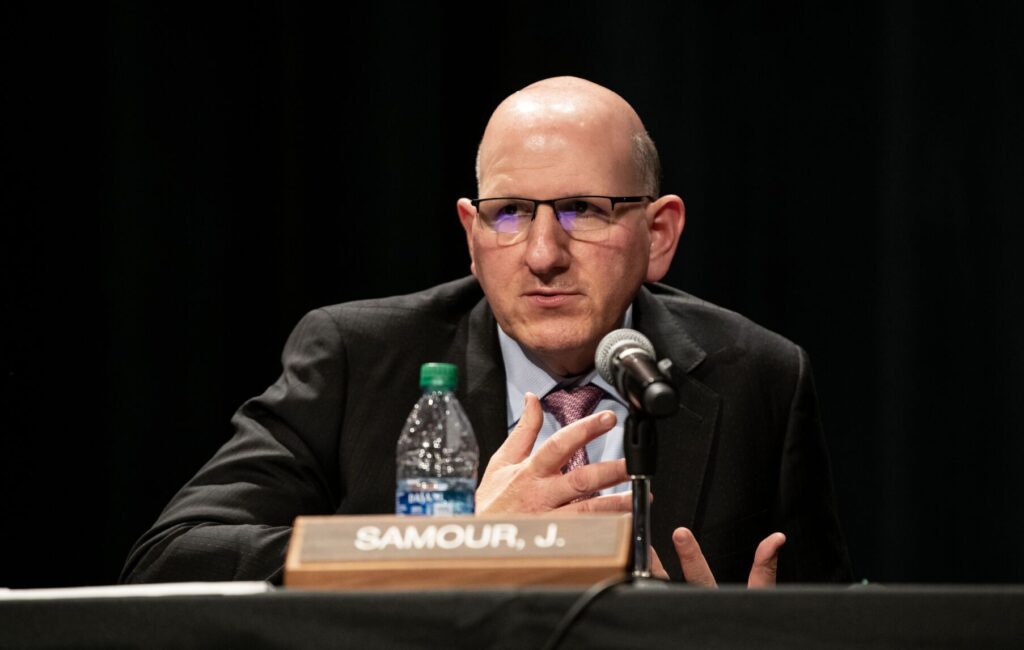The time for overdue sex offender sentence and treatment reform is probably never
State Sen. Irene Aguilar, a Denver Democrat, sat at the hearing table alone Feb. 22 and told members of the Senate Judiciary Committee that she was “very nervous” to present her bills. Rightly so. The direct beneficiaries of her proposals don’t have many defenders at the Capitol – or anywhere else for that matter.
Aguilar is a medical doctor who specializes as a lawmaker on health care policy. This year, she said, her preferred topic was a sea of question marks for being the subject of the wavering rhetoric of President Trump and the target of Republicans on Capitol Hill looking to bring radical change to the national health program put into place by President Obama and congressional Democrats.
Aguilar noted that she has been a member of the Judiciary Committee for years and that the committee in 2014 had heard damning testimony on the policies pursued by the state’s Sexual Offender Management Board. The testimony made an impression, she said.
“I thought at the time, I should look into this and find out about it and, well, this year, I had the time.”
Her first bill sought to reform sex offender sentencing laws.
Aguilar introduced Senate Bill 87 by recalling a crime that unfolded in Boulder on St. Patrick’s Day in 2014, when a Colorado University student “raped a drunken woman he pretended to be caring for,” as Aguilar explained. The accused, Austin Wilkerson, was convicted two years later, but the judge, wary of Colorado’s sentencing laws, went light on him.
Wilkerson was only 22 years old. The judge, citing Colorado sex-offender sentencing laws, said he feared Wilkerson might never be let out of prison. He sentenced Wilkerson to 20 years probation and 2 years in which he would spend his nights in the Boulder jail and his days attending classes.
The light sentence fueled public outrage. It also spurred observers to reconsider Colorado’s tough sex crime sentencing. As a 2016 Boulder Daily Camera headline put it: “Is Colorado’s indeterminate sentencing law keeping rapists out of prison?”
Aguilar explained that sex crime sentencing is tied to the 1998 Colorado Lifetime Supervision Act, which is based on the presumption that sex offenders are likely to continue to commit sex crimes. The act required that sex offenders stay behind bars for as long as it takes for them to be rated unlikely to offend again.
But Aguilar said treatment in prison is limited and so there’s no guarantee that high-risk offenders will ever be rehabilitated nor that low-risk offenders aren’t simply wasting away behind bars.
The judge in the Boulder case was convinced that Wilkerson would end up “warehoused” in prison and that the outcome of the trial and conviction would end in no “good result for anybody” involved in the case.
Let’s allow judges to impose sentences that fit the crime, Aguilar argued. That way, more victims would be more likely to see their rapists serve real time – if not life imprisonment.
Aguilar’s bill drew no cosponsors on the right or the left. It had only one supporter on the committee. Daniel Kagan, a Cherry Hills Democrat, thought justice would be “massively enhanced” by passing the bill. He voted in favor, “not for leniency, but for discretion and greater justice,” he said. Aurora Democrat Rhonda Fields joined the three Republicans on the committee to kill the bill.
Aguilar’s Senate Bill 141 came next. The bill proposed that low-risk sex offenders should be allowed to exit prison and receive the treatment they are sentenced to receive in the outside world. As it is, the backlog of prisoners going without therapy is a waste of taxpayer money, said Aguilar. “In 2015 there were 1,979 inmates on the referral list awaiting treatment, a 30 percent increase since 2012 … And 57 percent of those inmates have been rated low-risk.”
The problem of backlogged treatment was part of the damning testimony Aguilar and other members of the Judiciary Committee had heard in 2014.
That year, doctors working for California-based Central Coast Clinical and Forensic Psychology Services completed an external review of the Colorado Sexual Offender Management Board. The review was commissioned by the state’s Department of Public Safety acting on a request of the Legislature. The reviewers found the board seriously deficient in its work, mainly because its members were wedded to outdated psychological theories about sex offenders.
The problem was primarily that, from the 1990s right up to the present, the board has maintained that all sex offenders pose a “dangerously high risk” to the public that “can only be managed by constant vigilance.”
That mistaken view has resulted in policy that is expensive, ineffective and dangerous. Authorities are setting free high-risk offenders without sufficient treatment and leaving low-risk offenders to languish in prison, growing more dangerous as the years pass and therapy is delayed.
“The Sexual Offender Management Board can maintain, and arguably even increase, public safety at significantly less cost by refining its standards and guidelines to better reflect recent research,” wrote the reviewers.
After the committee hearing, Aguilar told the Statesman that reforming sex-offender policy would be a tough topic in any year, but that the Judiciary Committee took a turn this year that effectively doomed her efforts.
Last year the three-member Republican majority on the committee included Ellen Roberts, a dependable moderate, and Kevin Lundberg, a strong conservative who has sought to make judicial sentencing more practical and effective. Aguilar said Lundberg supported her reform bill.
This year, however, Roberts and Lundberg were replaced on the committee by Bob Gardner, a lawyer and a strong advocate for crime victims, and John Cooke, a county sheriff.
When it comes to sex offender policy reform, “victims’ advocates and law enforcement are hard sells – and understandably so,” said Aguilar. “It’s the rare victim who can see the injustice in the policies. Their lives have been ruined by these crimes.”
The clear problems identified in the system by the external reviewers and targeted by Aguilar will persist. Committee members made no closing remarks before voting down the proposal along party lines.
Aguilar was matter of fact about the results of the hearing.
“There are the clinical aspects in this that we will continue to ignore because we’re looking at the criminal aspects,” she said.











